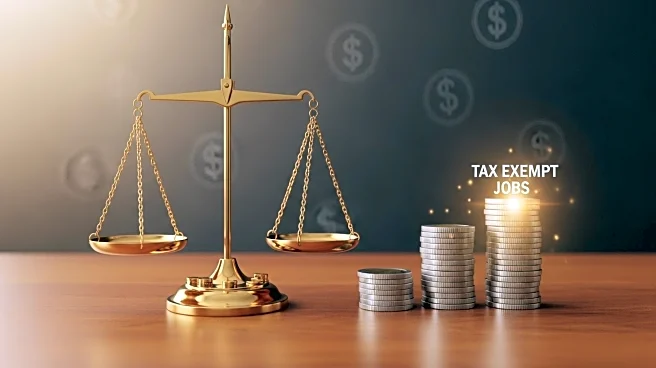What's Happening?
The U.S. Department of the Treasury has released a preliminary list of occupations that are exempt from paying federal income tax on tips under a new provision signed into law by President Trump. This provision, part of a broader tax cuts and spending bill, applies to workers in traditionally tipped jobs who earn less than $160,000 annually. The list includes a wide range of occupations such as golf caddies, blackjack dealers, podcasters, and social media influencers. The exemption is temporary, running from 2025 to 2028, and aims to alleviate the tax burden on workers in these roles. The Treasury Department was mandated to publish this list within 90 days of the bill's signing, and it categorizes the jobs into eight sectors, including food service, entertainment, and personal services.
Why It's Important?
This development is significant as it impacts millions of workers in the U.S. who rely on tips as a substantial part of their income. By exempting these tips from federal income tax, the policy could potentially increase the disposable income of these workers, many of whom are in lower-income brackets. However, the policy is also projected to increase the federal deficit by $40 billion through 2028, according to congressional budget analysts. The Joint Committee on Taxation estimates the cost of the tips deduction at $32 billion over ten years. The policy has sparked debate, with some viewing it as beneficial for low-income workers, while others criticize it for disproportionately benefiting higher earners within the tipped workforce.
What's Next?
As the policy is set to be in effect until 2028, its long-term impacts on the workforce and federal budget will be closely monitored. There may be shifts in employment patterns as workers and employers adjust to the new tax landscape. Additionally, the policy could face political scrutiny and potential amendments depending on its economic outcomes and public reception. Stakeholders, including policymakers and labor advocates, will likely continue to debate the merits and drawbacks of the exemption.
Beyond the Headlines
The policy raises questions about the broader implications of tax exemptions and their role in economic inequality. While it provides immediate financial relief to some workers, it may also incentivize shifts towards tipped employment, potentially altering labor market dynamics. Furthermore, the policy's impact on state and local tax revenues, which are not exempt, could lead to varied regional economic effects.










